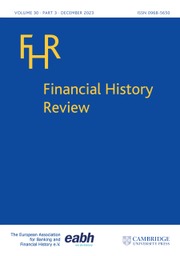Article contents
Trust and virtue in English banking: the assessment of borrowers by bank managements at the turn of the nineteenth century
Published online by Cambridge University Press: 10 June 2002
Abstract
Lucy Newton, Trust and virtue in English banking: the assessment of borrowers by bank managements at the turn of the nineteenth century
Much has been made of the relationships between English banks and their customers. This article aims to examine the perceptions of banks' managements and their procedures in the assessment of English and Welsh borrowing customers at the turn of the century. During this period, as banks assumed the modern corporate form, their managements attempted to impose a more formalised structure for lending decisions – one that could be standardised and applied throughout an organisation. The article examines the impact of such changes upon lending decisions, together with the information utilised in making them. It focuses upon the use of ‘subjective’ information and criteria in order to shed light upon a transitional period in banking organisation. It also considers related issues such as customer reputation; the transition from personalised to transaction banking; and the respective roles of local branches and London head offices in decision-making.
- Type
- Research Article
- Information
- Copyright
- © 2000 Cambridge University Press
- 13
- Cited by


